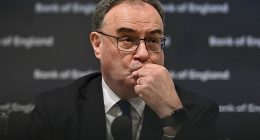EXPERTS have revealed whether signing up for a long-term fixed-rate mortgage is always the best option.
The Bank of England (BoE) increased its base rate for the 12th time in a row in May from 4.25% to 4.5%.
At the same time in 2022, it stood at just 1%.
The consecutive hikes have seen interest rates on savings accounts rise in tandem, in good news for those with large sums of cash stashed away.
But it’s also bad news for those with mortgages, as they tend to rise when the base rate increases too.
The BoE increases its base rate to bring down inflation, which means if that comes down, the base rate should too, and mortgage rates with it.


But all the uncertainty can cause confusion and leave you wondering whether it’s worth fixing a long-term fixed deal or opting for a shorter-term option.
So The Sun spoke to experts who shared what the best option might be for you.
Should I fix long-term?
There are three types of mortgages – fixed-rate, tracker and standard variable rate (SVR).
Fixed-rate mortgages mean your monthly payments will stay the same for the length of the agreed term, which offers more certainty.
Most read in Money
Fixed-rate periods come in different lengths including two, three, five and 10-years.
If you fix for longer, it can mean your monthly repayments are less compared to a shorter-term fix as well, although this isn’t a guarantee.
Either way, a longer-term fixed-rate mortgage might be worthwhile if you want the security of knowing what you will be paying every month over an extended period.
David Hollingworth, from L&C mortgages, said: “A 10-year fix could offer a safety first approach to someone that doesn’t want to worry about the ups and downs of rates.
“Someone with 10 years left to run may like the idea of pinning down a rate which they know is affordable and will avoid further increases.”
That said, fixed deals also come with early repayment charges and restrictions on overpayments.
So if you want more flexibility, a shorter-term fixed deal might suit you better.
Nicholas Mendes, technical manager at broker firm John Charcol, said: “A two-year fixed will give stability and homeowners the ability to re-review their options more regularly.”
Meanwhile, Rhys Schofield, mortgage adviser at Peak Mortgages, said deciding whether to opt for a longer-term fix depends on more than just repayments, but personal circumstances too.
“It’s not always as straightforward as just trying to chase the cheapest repayment if it means getting in a financial pickle further down the line or creating a hurdle for your life plans.”
Do you have a money problem that needs sorting? Get in touch by emailing [email protected]










